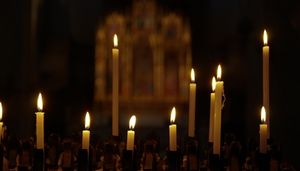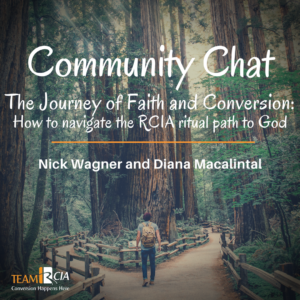 This past Easter Vigil, I was visiting a parish I had never been to before. I was truly uplifted by the beauty and quality of the entire liturgy. It was one of the best Easter Vigil liturgies I have celebrated. The key factor that made the liturgy so good was the effort the planners and ministers went to in order to ensure the full, conscious, and active participation of the worshiping assembly.
This past Easter Vigil, I was visiting a parish I had never been to before. I was truly uplifted by the beauty and quality of the entire liturgy. It was one of the best Easter Vigil liturgies I have celebrated. The key factor that made the liturgy so good was the effort the planners and ministers went to in order to ensure the full, conscious, and active participation of the worshiping assembly.
So keep all that in mind as I suggest an important element of the rite that could have been improved on. I am sharing this with you because it has to do with the Rite of Christian Initiation of Adults.
Unfortunately, there were no baptisms at this Vigil. That happens sometimes. It’s happened in parishes where I was part of the pastoral leadership. I am sure the pastoral leaders already realize that they need to redouble their evangelization efforts for the future so we are always fulfilling Jesus’s command to go and make disciples.
What did happen, after the homily and before the eucharist, is that the presider called forward the “candidates for confirmation.” I immediately thought this could mean three different kinds of candidates:
- Catholics baptized as infants who were not raised in their faith and who have not been confirmed nor have celebrated first communion
- Active Catholics who have been sharing in communion most of their lives and who missed confirmation somewhere along the way
- Non-Catholic Christians who were being received into the full communion of the Catholic Church
Baptized, uncatechized Catholics
The first group, baptized Catholics who were never raised in the faith and do not have an intimate relationship with Jesus, can be said to be “seeking to complete their Christian initiation” (RCIA 411 in the USA edition). The Rite of Christian Initiation of Adults says, “The high point of their entire formation will normally be the Easter Vigil” (RCIA 409). Note that even though a priest may confirm an adult whom he baptizes, he may not confirm an already-baptized Catholic without first receiving delegation from the bishop.
Active Catholics
The second group, active Catholics who are seeking confirmation, are not seeking the completion of their Christian initiation. The church teaches: “The holy Eucharist completes Christian initiation” (Catechism of the Catholic Church, 1322). Since these folks have already celebrated their first communion, they are not “re-completing” their initiation with the sacrament of confirmation.
Nevertheless, the sacrament of confirmation is still required, according to the Catechism of the Catholic Church, for the completion of baptismal grace (1285), the strengthening of baptismal grace (1289), and the perfection baptismal grace (1316). This teaching makes a bit more sense when confirmation is celebrated before one shares in the eucharist since by partaking in the Body and Blood of Christ “we are filled ‘with every heavenly blessing and grace’” (Catechism of the Catholic Church, 1402).
Because these active Catholics are not celebrating their initiation into Christ, the Easter Vigil is not the appropriate place for them to celebrate their confirmation. Because confirmation is one of the three sacraments of initiation, many parish communities mistakenly bring these active Catholics to the Vigil. However, they should only be there as members of the worshiping assembly, accompanying the catechumens to their actual initiation into Christ. Also, like the group above, a priest may not confirm an already-baptized Catholic without first receiving delegation from the bishop.
Christians from other traditions
The third group, those raised in another Christian tradition who are being received into the full communion of the Catholic Church, are not actually candidates for confirmation. They are candidates for Reception into the Full Communion of the Catholic Church. The rite of reception includes confirmation, but its celebration does not initiate these candidates into Christ. They are already initiated into Christ. And in many if not most instances, these candidates have a relationship with Christ.
For that reason, the National Statutes for the Catechumenate state, “It is preferable that reception into full communion not take place at the Easter Vigil lest there be any confusion of such baptized Christians with the candidates for baptism, possible misunderstanding of or even reflection upon the sacrament of baptism celebrated in another church or ecclesial community” (NSC 33).
Unlike the baptized Catholics in the two previous groups, a priest who receives someone into full communion not only may but must confirm the candidate (assuming they are not already validly confirmed). However, the rite should be celebrated in such a way that the high point is clearly eucharistic communion (see RCIA 475).
At the Easter Vigil I mentioned above, the two candidates were both non-Catholic Christians who were being received into full communion. So ideally, their celebration would have taken place some weeks previous—perhaps at a Sunday Mass just before Lent.
That would have left no one to celebrate any sacraments for the first time at this year’s Vigil in that parish. The solution to that, however, is not to bring people to the Vigil who should not be celebrating their sacraments there. Rather, we all need to do a much better job of evangelizing those who need to hear the good news of Jesus Christ so that we will constantly and consistently be initiating people into Christ.
Your turn
What questions do you have about baptized candidates at the Easter Vigil? What have you done to celebrate the sacraments of imitation with baptized candidates in your parish? Share your thoughts in the comments below.














Although I understand the ideal which is stated in the statutes and as you describe, it may not be “pratical” when dealing with multiple candidates who come to receive the Sacraments of Eucharist and Confirmation and have not been catechized since being Baptized as infants or those who recieved First Eucharist and never came back to the church. This has bern an issue all along
We are facing this in our parish in addition to young people who do not fit into our preparation for Confirmation because the “grade” was changed from 11th grade to 8th grade with a 2 tear preparation required.
Our paid staff is our secretary and CRE. The logistics of finding people willing to be trained to fill the teaching spots in the Religous Ed as well those who would be available for RCIA and additionally address the needs of those in the gaps is daunting. So it’s not just a matter of when to celebrate the Sacraments but the whole process of preparation needs to be addressed.
Hi Kris,
Thanks for your insightful comment. As you note, the preparation of all these various kinds of seekers is a pastoral issue that many of us struggle with. However, it is somewhat separate from when we celebrate the sacraments of each of these folks. The Rite of Reception into the Full Communion of the Catholic Church is a very simple rite, which is intended to be celebrated on a Sunday in Ordinary Time (and not at the Easter Vigil). It doesn’t require any extraordinary effort on the part of the parish leaders. And, the very celebration of the rite on a regular basis in the midst of the Sunday assembly catechizes the parish and all the other seekers about the dignity of baptism.
Thank you for writing such a clear article on this church teaching. We have year round initiation. The baptized candidates (Christian and Catholic) are received at a Sunday Mass when they are ready. (Catholics with delegation). The unbaptized are received at Easter Vigil. It is a beautiful and gloriously wet celebration with an almost full immersion. This year we had 4 adults and 26 children plus two infants who were part of two sibling groups. God is so very good.
Hi Jackie. Thanks so much for sharing your story. Your parish community is an inspiring example for the rest of us!
Of course, there are always exceptions to the norm (e.g., a candidate for full communion) who is married to a catechumen). The problem arises when it become normative to celebrate as many sacraments as possible at the Vigil (I once attended a Vigil where one couple was married). This often arises out of a genuine (and laudable) desire to make the Easter Vigil a summit of the liturgical year; it’s kind of a badge of honor if your Easter Vigil is extremely long and has many moving parts.
We are a small parish with a minimal staff. My practice is to focus on forming/resourcing an effective team, rather than trying to do it all myself.
At our parish, we have a 4-session preparation process for baptized Catholics who were never confirmed. We conduct this a couple of times a year, and conclude with Confirmation at a Sunday Mass in Ordinary Time. One skilled catechist can easily conduct these sessions (We use Mary Birmingham’s Confirming Adult Catholics).
For adult Catholics and/or candidates baptized in another Christian denomination who have had little or no catechesis, we often include them in extended catechesis with catechumens (never dismissal, of course), and periodically discern when they are ready for either preparation for Confirmation or acceptance into full communion (both of which would be celebrated in Ordinary Time). We have 5 people on our RCIA Team, who have become quite good at “sorting fish,” and alerting staff when someone might be ready for the next step.
We also encounter candidates baptized in another Christian denomination who, quite frankly, sufficiently catechized, and just need some one-on-one sessions before they are prepared for Confirmation (they are often the spouse of an active Catholic). I had one such candidate where her preparation was just a couple of months.
Mark, I love your commitment to providing for pastoral exceptions without making the exceptions the norm! I also appreciate your focus on forming/resourcing an effective team, rather than trying to do it all yourself. That’s important in every parish, but especially in parishes with minimal staff. Blessings on all the great work you are doing.
We continue to have all three types noted in the article each year. We are also trending towards 70% new folks being Hispanic. That demographic is culturally committed to Family reception of Sacraments. Of the rest 90% are of mixed faith ( including no faith) divorced & remarried couples or first time Marriage fiancés. These sub groups strongly prefer joint celebration. Our Archdioese insists that Catholics receive Confirmation at Pentecost Sunday special Mass. Yet, we had one young lady who saw her husband enter as a Catechumen this year and petitioned to celebrate both their situations together. So In the spirit of Pastoral nurturing our Pastor called together our team and we developed three separate Rites from the book that were celebrated at Easter Vigil Mass. I could go on in detail but post this to remind us all of the significant Hispanic impact of Family Sacraments and the drive for Internal Conversion of our Faith. It is a cultural and parish resource (and rules) issue that is coming to a head. Our parish population is growing with 90% being of Hispanic and Chin (largest refugee group of about 10,000 Chins have settled in area) heritage. Then there is the language and “undocumented “ facts of life with which we must deal. Parishes that have declining memberships and few Catechumens cannot appreciate this significant challenge. Pray for us all
Hi Bruce. Thanks for your dedication to finding pastoral solutions for your growing Latino and Chin membership. We will definitely keep you in our prayers.